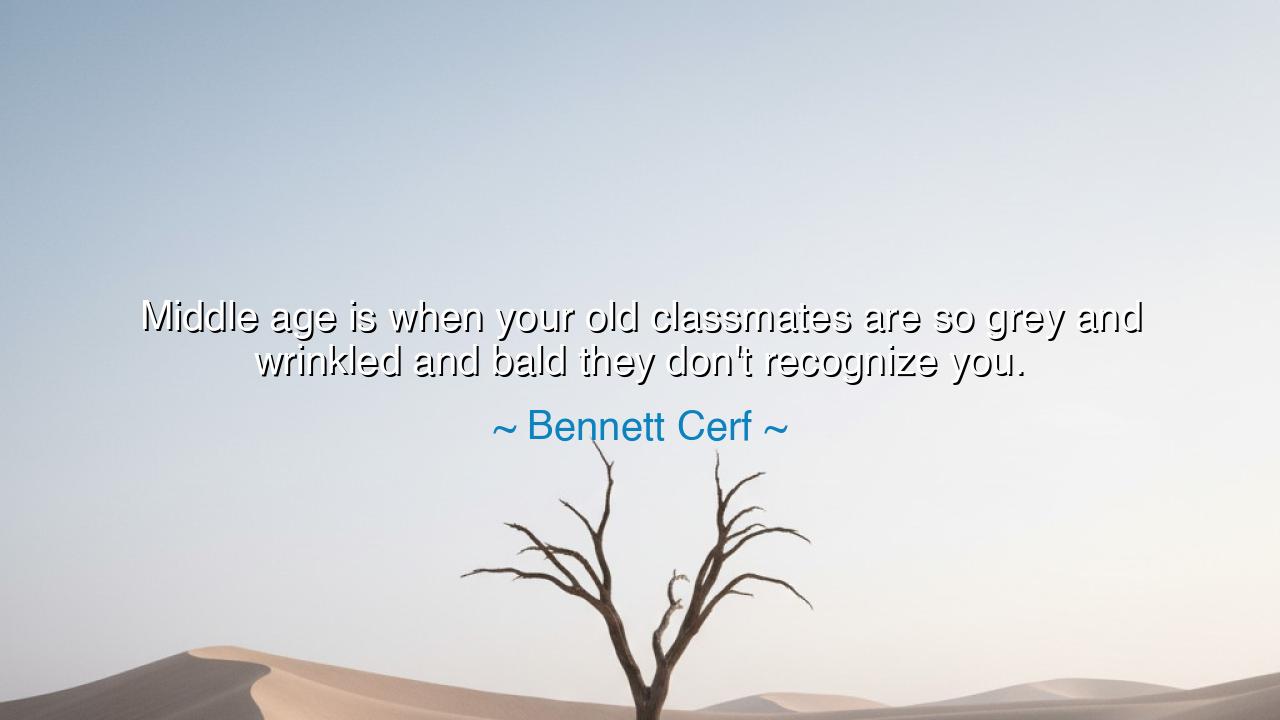
Middle age is when your old classmates are so grey and wrinkled
Middle age is when your old classmates are so grey and wrinkled and bald they don't recognize you.






In the timeless journey of life, where the ebb and flow of youth gives way to the wisdom of age, there is a moment when we are confronted with the inevitable truth of change. Bennett Cerf humorously reflects on this truth with his observation: "Middle age is when your old classmates are so grey and wrinkled and bald they don't recognize you." These words are not merely a playful jab at the ravages of time, but a poignant reminder that the passage of time is both a gift and a challenge. The moment when the faces of our past, once familiar and full of youthful vigor, transform into something unrecognizable is one that forces us to confront not just the physical changes of age, but the deeper questions about who we are and how we have lived our lives.
In the ancient world, age was viewed through a lens of reverence and wisdom. The Greeks, who placed such value on the mind, understood that while the body may grow frail, the soul had the potential to deepen with age. Socrates, despite his advancing years, continued to engage in vigorous intellectual debates, showing that the strength of character and wisdom could endure beyond the superficial signs of aging. The Romans also admired the elderly, seeing them as figures of authority and experience. The elders were the ones who guided society, not through their physical prowess, but through their depth of understanding. However, even in these cultures that revered age, the impermanence of the human body was acknowledged. Cerf’s quote humorously captures this truth—that no matter how revered or respected, we all face the universal reality of transformation over time.
Consider the story of King David from the Bible, whose reign as the great king of Israel spanned many years. In his later life, David was no longer the strong warrior who had once slain Goliath, but an aging king whose physical appearance had changed. Despite this, his wisdom and leadership were still revered by his people. In his old age, David was recognized not for the strength of his body, but for the strength of his legacy. The lesson here is that while middle age may bring physical changes that make us unrecognizable to those from our youth, what remains is the legacy we build—the relationships, the wisdom, and the character we cultivate.
In our own modern world, Cerf’s humorous observation reflects a truth that we all eventually face: the reality of middle age. When we reconnect with old friends or classmates, we often find that the youthful features we once admired are now replaced by signs of time—wrinkles, grey hair, and a thinning of once-lustrous locks. But what Cerf points out, with his usual wit, is not just the physical aspect of aging, but the realization that time moves forward, and we too, in our own lives, will undergo these changes. We are left to ask ourselves: How do we face the inevitable passage of time? Do we fear it, or do we embrace it?
Middle age, as Cerf captures so brilliantly, is a moment of reckoning. It is the time when the idealized youth we once knew seems distant, and we are forced to acknowledge our own transformation. We may not be able to stop the march of time, but we can choose how to meet it. The choice, as Socrates would have urged, lies in how we cultivate our minds and our souls. While we may not have the same vitality we did in our younger years, we gain the opportunity to reflect, to learn, and to grow in ways that are not always visible to the eye, but that shape who we are at our core.
The lesson that Cerf’s words impart is this: embrace change, for it is an integral part of the human experience. Aging is inevitable, but how we age is up to us. We can choose to lament the physical signs of time, or we can choose to focus on the wisdom we have gained, the relationships we have cultivated, and the impact we have made. Like King David, who was revered not for his youthful strength but for his wisdom and leadership, we too must recognize that our true worth is not bound to the appearance of our bodies but to the depth of our character and the strength of our spirit.
Practical action calls us to live with intention as we journey through middle age and beyond. Let us not fear the signs of aging but instead focus on the richness that each passing year brings. Seek to grow intellectually, emotionally, and spiritually, so that our legacy is one of substance, not merely appearance. Let us build relationships, create memories, and make choices that reflect the best of who we are becoming, rather than clinging to the fading image of who we once were. For in the end, it is not the wrinkles or grey hairs that define us, but the richness of the lives we lead and the wisdom we gather along the way.






AAdministratorAdministrator
Welcome, honored guests. Please leave a comment, we will respond soon